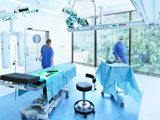Health, nutrition and environment
»Hospital Engineering Laboratory« at Fraunhofer’s inHaus Center in Duisburg
On July 18, 2013, the »Hospital Engineering Laboratory« was opened at Fraunhofer’s inHaus Center in Duisburg. The laboratory brings together four Fraunhofer Institutes and over 60 partner companies to develop and test solutions that explore their vision of the hospital of the future. Covering an area of roughly 350 square meters, the laboratory offers an up-to-the-minute environment in which to carry out development and testing. It includes an operating room, patient, nurse, and doctor’s room, a rehabilitation area complete with training equipment, as well as store rooms and utility rooms.
Engaging some 5.4 million people, the health sector is Germany’s biggest employer – yet one in four hospitals now find themselves in dire financial straits. Driving forward innovation calls for efficient processes and modern technologies. Hospitals are finding that their room for maneuver is increasingly being restricted by regulation and cost pressures. In this environment – not least due to the need to remain competitive – there is a growing willingness to exploit technological innovations and optimize processes in order to maintain a high quality of care and expand provision.
Synchronized processes
If they are to equip themselves to face the future, hospitals and clinics must get a firm grip on their costs and increase their capacity. The tools to do this will be provided by advances in medical technology, improved diagnosis, and closely integrated courses of treatment. The Fraunhofer-Gesellschaft’s newly opened “Hospital Engineering Laboratory” in Duisburg provides a platform for research and collaboration, with the aim of finding innovative system solutions that help improve hospitals by thinking about them as a comprehensive system.
The primary focus will lie on concepts tailored toward advancing clinical logistics and healthcare systems in general, as well as integrated patient and information management and more energy efficient operation of rooms and buildings. The sheer volume of highly complex solutions on offer does make it difficult, however, to give a concise answer as to how these new information and communication technologies, items of medical equipment, and software architectures will be applied in detail.
Assessing solutions in a practical context
Fraunhofer’s Hospital Engineering Laboratory at the inHaus Center in Duisburg offers service providers and users in both inpatient and outpatient environments the opportunity to test new developments in a realistic setting and to showcase solutions’ capabilities. The research and testing platform includes a model hospital complete with reception area, a patient’s room, an operating room, and a rehabilitation area.
The laboratory is a public facility, bringing together partners from industry and research in North Rhine-Westphalia and university clinics and hospitals from the Ruhr in addition to researchers from four Fraunhofer Institutes. One of the laboratory’s most important objectives is to assess technological innovations and put them to the test in a hospital setting before their definitive market launch.
The rate of progress in medical technology is constantly on the rise, with development cycles for new products becoming shorter and shorter. As practical as new technologies might be, it is always important to consider them in the light of future treatment scenarios. Without the necessary prior experience to hand, impact assessments are difficult, particularly in the sensitive setting of a hospital. The Hospital Engineering Laboratory offers a solid platform for examining new developments without disrupting established processes.
The Hospital Engineering Laboratory is a development and demonstration laboratory that focuses on innovative solutions for hospitals. It is the place where integrated solutions addressing patient safety, material transparency, logistics, energy management, and information technology are tested in a practical context and further developed.
- Fraunhofer-inHaus-Center (inhaus.fraunhofer.de)
Last modified:
 Fraunhofer Institute for Environmental, Safety and Energy Technology UMSICHT
Fraunhofer Institute for Environmental, Safety and Energy Technology UMSICHT